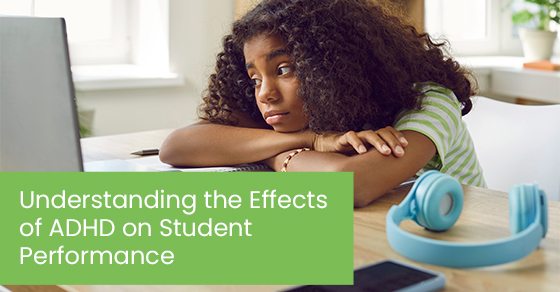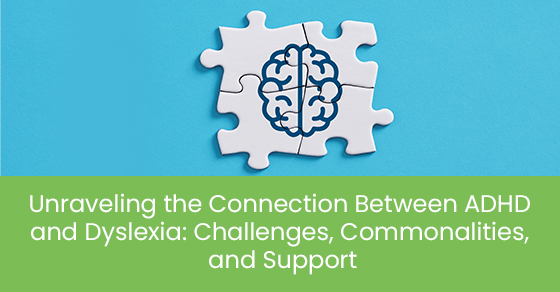To parents and teachers of students with attention deficit hyperactivity disorder (ADHD), it’s a familiar scenario: a child with aptitude, intelligence, and an eagerness to learn cannot seem to stay on top of what’s being taught in the classroom and struggles to execute and deliver their assignments. Incomplete homework, missed due dates, poor test results, and unread textbooks are only the tip of the iceberg for students coping with the condition. Lurking beneath the surface is an invisible constellation of challenges and symptoms that must be addressed through targeted strategies to help them perform like their peers.
ADHD is a neurodevelopmental condition that significantly affects academic performance, often contributing to underachievement. Students with ADHD face significant problems with noticing, understanding, and remembering information, which can create gaps in their learning. They can overcome these struggles, however, with supports that include ADHD and executive function coaching, math tutoring, and reading tutoring, which can help them develop effective learning strategies and remove barriers to success.
ADHD’s Impact on Information Processing
One of the core symptoms of ADHD is inattention, making it challenging for students to maintain focus on academic tasks. In a classroom setting, distractions abound, and people with ADHD may find it difficult to filter out irrelevant stimuli. It can be particularly frustrating when it comes to reading, going over a paragraph repeatedly to absorb what’s on the page or becoming visually distracted by what they are seeing. This constant struggle to pay attention impedes the encoding of new information, resulting in incomplete comprehension and gaps in learning.
For example, during a math class, a student with ADHD may struggle to concentrate on the teacher’s explanation of a new concept. This lack of attention can lead to a fragmented understanding of the material, making it difficult for the student to apply the new information independently. Math is a series of building blocks where more advanced learning relies on a solid grasp of previously introduced concepts. Math tutors can help pinpoint missing information and work with students to address and build on topics that were missed or poorly understood.
Working memory, responsible for holding and manipulating information temporarily, is also often impaired in people with ADHD. This limitation affects a student’s ability to follow multi-step instructions, solve complex problems, and remember important details. In subjects like math, where sequential processing is crucial, students with ADHD may face difficulties recalling the steps involved in solving a problem. This challenge can result in errors and frustration, hindering academic achievement.
In addition to problems with memory, ADHD is characterized by impulsive behaviour, which can lead to hasty decision-making and a lack of thoughtful consideration of academic tasks. In the realm of reading and comprehension, impulsive readers may gloss over important details, miss key points, or fail to grasp the deeper meaning of a text. These issues are particularly evident during assessments, where impulsive responses can result in lower grades, despite the student’s underlying knowledge of the material. Students with these problems can benefit from ADHD and executive function coaching to learn specific strategies that address those weaknesses.
Children with ADHD may also find it hard to sit still. The fidgeting and restlessness that accompany hyperactivity can make it a challenge to focus on what is being read or taught.
The Need for Repetition in Instruction
Given the hurdles posed by ADHD in information processing, students with the condition often require more repetition in instruction to solidify their understanding of academic material. Repetition serves as a crucial tool in reinforcing learning and compensating for the difficulties associated with attention and working memory.
Repetition helps create and strengthen neural pathways associated with learning. For students with ADHD, whose attention may fluctuate, repeated exposure to information enhances the chances of encoding it into long-term memory. This is especially important in subjects like math, where a strong foundation of basic concepts is essential for tackling more advanced topics.
Automaticity, the ability to perform tasks without conscious thought, is also a key element in academic success. By repeatedly practicing skills and concepts, students with ADHD can achieve a level of automaticity that facilitates smoother information processing and retrieval. For instance, regular and focused practice with a reading coach can enhance a student’s ability to decode words effortlessly, allowing them to shift their attention to comprehension and analysis.
ADHD Coaching and Executive Function Coaching: Bridging the Gap
In response to the unique needs of students with ADHD, interventions such as ADHD coaching and executive function coaching have emerged as valuable tools for improving academic performance. Coaching strategies aim to empower students with ADHD by teaching them skills to manage their symptoms, enhance executive functioning, and reduce cognitive load.
ADHD Coaching: Enhancing Focus and Task Management
ADHD coaching focuses on the specific challenges posed by inattention, impulsivity, and hyperactivity. Coaches work with students to develop personalized strategies for increasing focus, staying on task, and managing time effectively. For example, a math tutor incorporating ADHD coaching principles might help a student break down complex problems into smaller, more manageable steps. This approach aligns with the coaching strategy of chunking information, making it easier for students with ADHD to process and retain.
Executive Function Coaching: Improving Self-Regulation and Cognitive Skills
Executive functions are the cognitive processes responsible for managing thoughts, actions, and emotions. Students with weak executive function skills have difficulty planning, organizing, and regulating their behaviour. An executive function coach collaborates with students to develop strategies for self-regulation, goal-setting, and cognitive skill improvement. A reading coach, for example, might help a student create a personalized system for note-taking, ensuring that important details are captured and easily retrievable.
Reducing Cognitive Load: A Path to Academic Success
Cognitive load refers to the mental effort required for learning and processing information. Students with ADHD often experience an increased cognitive load because of their difficulties with attention and working memory. Coaching strategies focus on minimizing this load by teaching students how to break tasks into smaller, more manageable components. For instance, an ADHD coach might work with a student on developing a systematic approach to studying, breaking down study sessions into focused intervals with planned breaks. This approach not only improves retention but also reduces the cognitive strain associated with extended periods of concentrated effort.
Understanding the impact of ADHD on academic performance is crucial for developing effective interventions that address the unique needs of students with this condition. From attention difficulties to working memory challenges, ADHD creates specific hurdles in the learning process that require individualized approaches.
At Evoke Learning, we offer students ADHD coaching and executive function coaching to reduce academic struggles and help them succeed. By giving our clients the skills to enhance focus, manage tasks, self-regulate, and reduce cognitive load, our coaches reduce obstacles to pave the way for improved academic performance. Additionally, our math and reading tutors—experts in the nuances of ADHD—can create a holistic approach to address the challenges students face. A combination of support, targeted instruction, and personalized strategies can make a tremendous difference in academic outcomes for every child, irrespective of their neurodevelopmental differences. Give us a call to learn how we can help.
Recommended Reading
Smart but Scattered by Peg Dawson and Richard Guare
This book provides practical strategies for parents, teachers, and people with ADHD to address executive function deficits and improve organizational skills.
The ADHD Advantage by Dale Archer
Archer explores the positive aspects of ADHD and offers insights into leveraging its strengths, providing a fresh perspective on the condition.
Take Charge of ADHD by Russell A. Barkley
Barkley, a renowned expert in ADHD, offers evidence-based strategies for managing ADHD symptoms and improving daily functioning.


